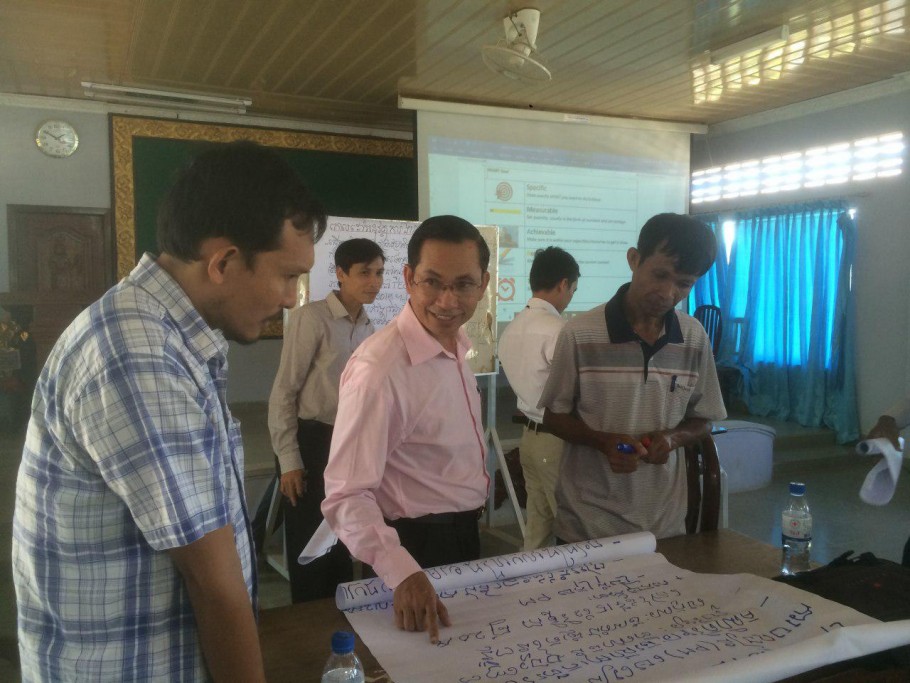
This blog post was originally published on UNESCO's IIEP Learning Portal. It is the third in a series of contributions by VVOB. Read the previous ones on teacher professional development in Vietnam here and remedial teaching in Zambia here.
Cambodian policies and action plans
The Cambodian Ministry of Education, Youth and Sports (MoEYS) is investing heavily in a comprehensive education reform to achieve the Sustainable Development Goals (SDGs) by 2030. The vision is to develop a strong and regionally competitive education system for a knowledge society.
The policies and action plans regarding school leaders focus on strengthening the effectiveness of school leaders and enabling school leaders to take up autonomous administrative and financial management. To achieve this, the MoEYS is creating standards for school directors, developing a school management handbook, creating a school director council and training school directors.
School leaders have a crucial responsibility in making sure their teachers teach well. To support them in this responsibility, the government aims to establish and use mechanisms that monitor and evaluate teachers. The teacher performance appraisal system will be reviewed to better reflect the professional standards for teachers, the job descriptions and specifications. It will also link to the new teacher career pathway. School directors will receive training on the skills to conduct on-site mentoring and monitoring.
The main idea is to turn school directors into permanent inspectors for their own schools. Once the policies are in place, they will be empowered with the right to monitor and give feedback to teachers based on the teacher professional standards and the school management handbook.
VVOB's approach to empowering school leaders
In Cambodia, VVOB supports the MoEYS to achieve these objectives and strengthen the effectiveness of school leaders, but from a different point of view. VVOB starts its approach of empowering the school leaders by capacitating them with the skills of coaching. VVOB views coaching as an essential part of a school leader’s role as the main supporter of her/his teachers’ continuous professional development. VVOB believes that teachers’ work is better improved through coaching primarily, supported by a system of monitoring and evaluation.
To show the importance of the coaching skills over the competences, procedures and forms to do staff appraisals, VVOB organised a 4-day training on coaching skills supplemented with a 1-day training on staff appraisal. This training is part of a longer capacity development trajectory to empower school leaders. The school leaders received a first training which will be followed up with individual coaching and peer learning.
As a coaching framework, VVOB uses the GRROW model by the late Belgian coach and consultant Jef Clement. The model is based on the classic GROW model, where the letters stand for goal, reality, options and way forward, with the addition of resources. More important than the model itself, are the 7 key coaching skills:
- Explore
- Appreciate and reinforce
- Confront and stay connected
- Challenge
- Inspire
- Allow and give space
- Relax and keep your sense of humour
The positive mindset and foundation to use coaching to evoke and support teachers’ learning was well received from the beginning of the training. Coaching gives the school directors a tool that shifts them away from the more directive alternative of monitoring and evaluation.
Coaching was shown as an action that differs from the (slightly) more directive actions of mentoring and monitoring. The distinction between mentoring and coaching is sometimes subtle and not always necessary to make. What is more important is that the school director believes in the teacher’s ability and potential to grow, and that s/he uses the 7 key skills to support the teacher’s growth. The skills are easy to understand, generally applicable in other forms of management and can even be extended to the private context.
[Read on below picture]

Mr. Chum Sophal, Director of the Teacher Education College of Battambang province (pictured above, center):
"Following the training, I tried out the coaching skills myself. I had a coaching conversation with one of my staff members and consciously used exploring and challenging questions, while maintaining a relaxed atmosphere and giving my staff member space. The result was that my staff member better understood his own behaviour and role within our school. He was happy with our conversation and felt more motivated again."
By experimenting with the different skills, the school leaders very quickly experienced the positive effect they had on the coachee. Although the skills are difficult to master, the threshold to apply them is low. The constructive atmosphere of the training and the guiding role as coach empowered the school leaders.
Mr. Chum Sophal, Director of the Teacher Education College of Battambang province:
"Leadership and coaching go hand in hand. The coaching training that VVOB provided to my deputy directors was an eye-opener for them. They understood clearly that coaching our teaching staff is an essential part of their tasks and responsibilities. They don’t yet have the confidence and courage to apply these coaching skills, but the first step is taken: they feel empowered in their role as leaders."
In the next phase of the capacity development trajectory of the school leaders, VVOB will coach the school directors individually and bring them together to learn from each other’s successes and challenges to further empower them.




